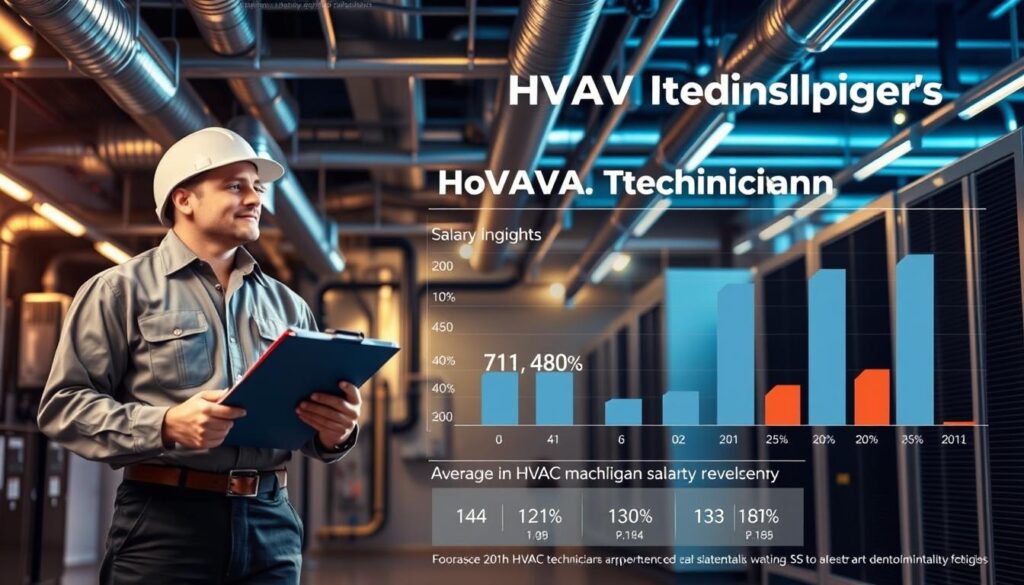Affiliate Disclosure
HVAC Guide Guys is a participant in the Amazon Services LLC Associates Program, an affiliate advertising program designed to provide a means for sites to earn advertising fees by advertising and linking to Amazon.
How Much Do HVAC Techs Make in the US? Ever wondered how much HVAC technicians earn? The HVAC industry’s salary range can guide your career choices. Knowing what HVAC techs make is key to setting income goals.

The HVAC field is booming, with a median salary of $50,590. Salaries range from $46,000 to $68,000 yearly. Your pay depends on experience, location, and skills.
Thinking about a career in HVAC? Want to grow in your current role? Understanding HVAC tech salaries is essential. This article will explore salary details, regional differences, and career advancement.
Key Takeaways
- Median HVAC technician salary is $50,590 annually
- Salary range spans from $46,000 to $68,000
- Earnings vary based on experience and specialization
- Geographic location significantly impacts income
- Career growth opportunities exist in the HVAC industry
Table of Contents
Understanding HVAC Technician Salaries Nationwide
The HVAC industry offers promising career opportunities with competitive salaries. These wages attract professionals across the United States. Your earnings depend on experience, location, and specialization.
The national HVAC market is robust and growing. The demand for skilled HVAC professionals is increasing. This is due to technological advancements and energy efficiency needs.
Current Market Dynamics
The HVAC job market is exciting for those seeking a stable and rewarding career. Key insights include:
- Steady growth in residential and commercial HVAC installations
- Increasing emphasis on energy-efficient systems
- Rising demand for skilled technicians nationwide
National Wage Breakdown
HVAC technician wages vary by experience and region. Here’s a snapshot of average earnings:
| Experience Level | Hourly Rate | Annual Salary |
|---|---|---|
| Entry-Level | $22.47 | $46,740 |
| Mid-Career | $27.65 | $57,500 |
| Experienced | $32.83 | $68,280 |
Salary Progression Insights
Your earnings can increase with experience and certifications. Skilled technicians who invest in continuous learning and specialized training often see the most substantial salary growth.
Explore Our HVAC Shop
Looking for top-rated HVAC tools, parts, and accessories? Visit our shop and find the perfect solution for your needs.
Visit the ShopHow Much Do HVAC Techs Make By Experience Level
Your earnings as an HVAC technician can really grow with experience. Beginners start with lower pay, but as you learn more, your income can rise a lot. This is thanks to the skills and knowledge you gain.
As you work more years, your salary will go up. This is because you get better at your job and learn more. Becoming an expert in HVAC can really pay off.
| Experience Level | Hourly Rate | Annual Salary |
|---|---|---|
| Entry-Level (0-5 years) | $22.00 | $45,760 |
| Mid-Level (6-9 years) | $27.65 | $57,512 |
| Senior/Management (10+ years) | $32.83 | $68,286 |
There are ways to make more money in HVAC. Here are some tips:
- Pursue advanced technical certifications
- Specialize in complex HVAC systems
- Develop strong customer service skills
- Stay updated with emerging technologies
Investing in your professional growth can dramatically increase your hvac pay rates over time, transforming an entry-level position into a lucrative long-term career.
Explore Our HVAC Shop
Looking for top-rated HVAC tools, parts, and accessories? Visit our shop and find the perfect solution for your needs.
Visit the ShopTop-Paying States for HVAC Technicians
When looking at hvac tech compensation, some states really stand out. They offer great chances for professional income. HVAC technicians can make more money by choosing the right place to work.
The top three states for HVAC pros have amazing financial offers. These states go beyond the usual wages. Knowing these areas can really boost your career.
California: The Golden State of HVAC Opportunities
California is at the top with an average salary of $59,200 for HVAC techs. The state’s strong tech sector and varied climate need skilled HVAC pros.
- High-density urban centers
- Diverse climate zones
- Advanced technological infrastructure
New Jersey: Compact State, Competitive Wages
New Jersey offers HVAC techs an average salary of $58,300. The state’s close to big cities and industrial areas. This creates a big need for skilled HVAC pros.
| State | Average Annual Salary | Key Market Factors |
|---|---|---|
| California | $59,200 | Tech-driven market, diverse climate |
| New Jersey | $58,300 | Industrial corridors, urban density |
| Washington | $58,000 | Tech industry, green energy focus |
Washington: Emerging HVAC Market
Washington is the third top state with an average salary of $58,000. The state’s growing tech sector and focus on green energy offer unique chances for HVAC techs.
By knowing these high-paying markets, you can plan your HVAC career for the best financial success.
Factors Affecting HVAC Technician Earnings

Your earnings as an HVAC technician depend on several key factors. Knowing these can help you earn more.
Where you work greatly affects your salary. Cities usually pay more than rural areas. This is because cities have more jobs and higher costs of living.
- Urban areas often provide 15-25% higher wages
- Regions with extreme climates demand more HVAC services
- Coastal and southwestern states tend to offer better compensation
How long you’ve been working also matters a lot. New technicians earn less, but those with more experience get paid more.
| Experience Level | Typical Annual Earnings |
|---|---|
| Entry-Level (0-2 years) | $35,000 – $42,000 |
| Mid-Career (3-5 years) | $45,000 – $55,000 |
| Experienced (6-10 years) | $55,000 – $70,000 |
Having special skills and certifications can really boost your income. Investing in professional development is key for career growth.
- EPA certification enhances marketability
- NATE credentials demonstrate advanced expertise
- Specialized system knowledge increases earning
Working on commercial HVAC projects usually pays more than residential work. Technicians who work on big industrial systems can earn a lot more than those who install systems in homes.
Explore Our HVAC Shop
Looking for top-rated HVAC tools, parts, and accessories? Visit our shop and find the perfect solution for your needs.
Visit the ShopCommercial vs Residential HVAC Salaries
When looking at hvac technician salaries, it’s key to know the difference between commercial and residential work. The HVAC field offers many paths with different money-making chances.
Your earnings can change a lot based on the HVAC systems you work with. Each area has its own benefits for making more money in your hvac career.
Commercial HVAC Pay Rates
Commercial HVAC techs usually make more because of the big systems they handle. Important things that affect their pay include:
- Sophisticated building infrastructure
- More complex climate control systems
- Higher technical skill requirements
Residential Service Income
Residential HVAC work gives steady chances to make money. Technicians can earn well through:
- Regular maintenance contracts
- Emergency repair services
- Seasonal installation projects
Specialized System Compensation
Getting good at specific HVAC systems can really up your earnings. Think about focusing on:
| Specialized System | Average Additional Earnings |
|---|---|
| Industrial Refrigeration | $5,000 – $10,000/year |
| Data Center Cooling | $7,000 – $12,000/year |
| Green HVAC Technologies | $4,500 – $8,500/year |
Choosing to specialize can change your HVAC career path and increase your earnings.
Career Growth and Salary Progression
Your HVAC job income can really grow as you move up in your career. Starting as a beginner, you’ll get many chances to increase your hvac technician wages. This is through learning new skills and becoming more specialized.
The HVAC career path is well-structured:
- Apprentice Technician (0-2 years)
- Journeyman Technician (3-5 years)
- Senior Technician (6-10 years)
- Master Technician or Technical Supervisor (10+ years)
As you advance, your pay will go up a lot. Beginners might start at $35,000. But, experienced pros can make $65,000 to $85,000 a year.
| Career Stage | Average Annual Salary | Skill Development Focus |
|---|---|---|
| Apprentice | $35,000 – $42,000 | Basic technical skills |
| Journeyman | $45,000 – $55,000 | Advanced system repairs |
| Senior Technician | $55,000 – $70,000 | Complex installations |
| Master Technician | $70,000 – $85,000 | Leadership and specialization |
Getting specialized certifications and keeping up with new learning can help you earn more. Think about getting advanced training in commercial systems, green tech, or energy-saving solutions. This can really boost your income.
Explore Our HVAC Shop
Looking for top-rated HVAC tools, parts, and accessories? Visit our shop and find the perfect solution for your needs.
Visit the ShopImpact of Certifications on HVAC Income
Getting better at your job isn’t just about working more hours. Getting certified can really help you earn more and open up better job chances in the HVAC field.
Getting the right certifications can change your career path and affect how much you earn. Let’s look at the top certifications that can make you stand out.
EPA Certification Benefits
The Environmental Protection Agency (EPA) 608 Certification is key for HVAC techs. It shows you know how to handle refrigerants and follow environmental rules.
- Shows you’re good at managing refrigerants
- Law requires it for working with refrigeration systems
- Can raise your starting salary by 5-10%
NATE Certification Value
North American Technician Excellence (NATE) certification is the top choice for HVAC pros. It shows you’re really skilled.
- Confirms you have deep technical knowledge
- Can get you paid more
- Shows you’re serious about growing professionally
Additional Industry Credentials
There are more certifications beyond EPA and NATE that can make you more attractive and earn you more in the HVAC world.
- Energy efficiency specialist certification
- Commercial HVAC systems certification
- Green technology installation credentials
“Certifications are not just pieces of paper—they’re investments in your professional future.” – HVAC Industry Expert
By choosing the right certifications, you can stand out in a tough job market. This can lead to better-paying jobs in HVAC tech.
Regional Market Demands and Salary Variations

It’s important to know how much HVAC technicians make in different places. The United States has many areas with different prices for HVAC work. This is because of local market conditions.
There are a few main reasons for these differences:
- Climate variations affecting HVAC service demand
- Local economic development
- Population density
- Energy efficiency regulations
Extreme climate regions often offer higher compensation for HVAC professionals. Places like Alaska and Hawaii have unique salary patterns. Alaska needs strong heating systems for its cold winters. Hawaii, on the other hand, requires advanced cooling for its warm weather.
“Location can significantly impact your earning in the HVAC industry” – Professional HVAC Industry Analyst
Urban areas usually pay more than rural ones. Cities with fast growth and new tech offer better wages for HVAC workers.
To make more money, you need to understand these regional differences. Look into local job markets and stay up-to-date with new energy tech. Also, learn specialized skills to increase your earnings in different places.
Explore Our HVAC Shop
Looking for top-rated HVAC tools, parts, and accessories? Visit our shop and find the perfect solution for your needs.
Visit the ShopComparing HVAC Salaries to Other Trades
Looking at hvac trade income helps us see how HVAC salaries stack up against other skilled trades. This knowledge is key for planning your career. The trade industry offers good pay across many specialties, with HVAC pros doing well in the market.
The hvac technician salary scene shows some interesting comparisons with other trades:
- HVAC technicians average around $25-$27 per hour
- Electricians earn about $27.01 per hour
- Plumbers make roughly $26.52 per hour
Electrician Wage Comparison
Electricians and HVAC technicians have similar pay. Both need special training and technical skills. Experienced pros in both fields can earn a lot, up to $70,000 to $80,000 a year.
Plumber Salary Differences
Plumbing and HVAC trades have similar wages. The main differences come from job needs and where you work. Some places pay more because of local needs and seasonal work.
Overall Trade Industry Position
HVAC technicians are in a strong spot in the skilled trades market. They need technical skills, there’s always demand, and they can specialize. This makes HVAC a great career for those wanting stable, well-paid work.
Skilled trades offer strong career chances with good pay and little student debt.
Conclusion
The HVAC industry is full of chances for skilled workers. It offers stable and rewarding jobs. Your growth in this field depends on developing skills, getting certifications, and knowing what the market needs.
As technology changes, HVAC technician pay keeps up. This shows how important the field is for keeping places comfy and saving energy.
Getting better at your job and getting recognized can really help. The industry is expected to grow 5% from 2020 to 2030. This is great news for those who want to learn more.
Smart homes and better energy use will open up new chances. These changes will help HVAC techs who are ready for them.
Working in places that need more HVAC techs can boost your pay. Learning about new tech and systems is key. It makes your HVAC job better and more rewarding.
The future of HVAC jobs is bright. There are many ways to grow and earn well. Being open to learning and changing will help you succeed in this important field.

